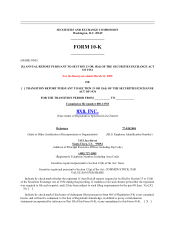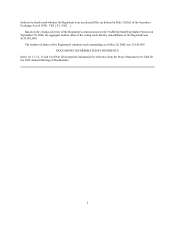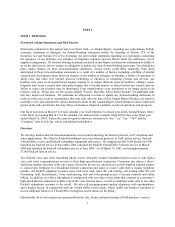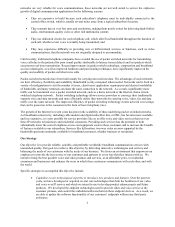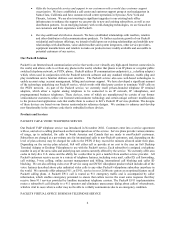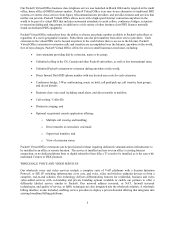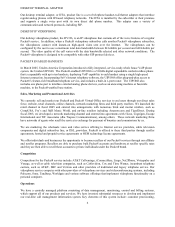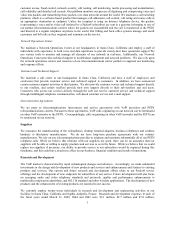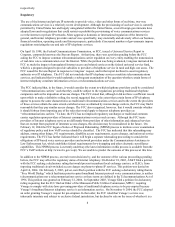8x8 2005 Annual Report Download - page 11
Download and view the complete annual report
Please find page 11 of the 2005 8x8 annual report below. You can navigate through the pages in the report by either clicking on the pages listed below, or by using the keyword search tool below to find specific information within the annual report.8
respectively.
Regulatory
The use of the Internet and private IP networks to provide voice, video and other forms of real-time, two-way
communications services is a relatively recent development. Although the provisioning of such services is currently
permitted by United States law and largely unregulated within the United States, several foreign governments have
adopted laws and/or regulations that could restrict or prohibit the provisioning of voice communications services
over the Internet or private IP networks. More aggressive domestic or international regulation of the Internet in
general, and Internet telephony providers and services specifically, may materially and adversely affect our business,
financial condition, operating results and future prospects, particularly if increased numbers of governments impose
regulations restricting the use and sale of IP telephony services.
On April 10, 1998, the Federal Communications Commission, or FCC, issued a Universal Service Report to
Congress, commonly known as the Stevens Report. At that time, there was a petition pending before the FCC
asking the FCC to impose common telecommunications carrier regulation on every entity enabling the transmission
of real-time voice communication over the Internet. While the petition was being evaluated, Congress instructed the
FCC to study the impact of unregulated Internet access and related services on the federal universal service fund,
which is a program designed to provide subsidies to providers of telephone service in rural and high cost areas. The
FCC issued the Stevens Report in response to Congress’ request, and in that report declined to assert regulatory
authority over IP telephony. The FCC did not conclude that IP telephony services constitute telecommunications
services, and indicated that it would undertake a subsequent examination of the question whether certain forms of
Internet telephony constitute information services or telecommunications services.
The FCC indicated that, in the future, it would consider the extent to which telephony providers could be considered
“telecommunications carriers” such that they could be subject to the regulations governing traditional telephone
companies such as the imposition of access charges. The FCC stated that, although it did not have a sufficient record
upon which to make a definitive ruling, the record suggested that, to the extent that certain forms of IP telephony
appear to possess the same characteristics as traditional telecommunications services and to the extent the providers
of those services obtain the same circuit-switched access as obtained by interexchange carriers, the FCC may find it
reasonable that they pay similar access charges. The FCC also recognized, however, that it would consider whether
it should forbear from imposing any of the rules that would apply to Internet telephony providers as
“telecommunications carriers.” To date, the FCC has not imposed regulatory surcharges or traditional common
carrier regulation upon providers of Internet communications services such as ours. Although the FCC treats
providers of Internet telephony services no differently from providers of other information and enhanced services
that are exempt from payment of interstate access charges, this decision may be reconsidered in the future. On
February 12, 2004 the FCC began a Notice of Proposed Rulemaking (NPRM) process to institute a new examination
of regulatory policy and how VoIP services should be classified. The FCC has indicated that this rulemaking may
address, among other things, 911 requirements, disability access requirements, access charges, and universal service
requirements. The FCC has further indicated that it will begin a separate rulemaking proceeding to consider the
obligations of IP-based voice services providers and network providers under the Communications Assistance to
Law Enforcement Act, which establishes federal requirements for wiretapping and other electronic surveillance
capabilities. This NPRM process is currently underway (the latest information on this process is available from the
FCC’s VoIP website at http://www.fcc.gov/voip). We are unable to predict the outcome of this process at this time.
In addition to the NPRM process, several recent decisions by, and the outcome of the various proceedings pending
before, the FCC may affect the regulatory status of Internet telephony. On October 18, 2002, AT&T filed a petition
with the FCC seeking a declaratory ruling that would prevent incumbent local exchange carriers, or ILECs, from
imposing traditional circuit-switched access charges on phone-to-phone IP services. This petition was denied on
April 14, 2004. On February 5, 2003, pulver.com filed a petition with the FCC seeking a declaratory ruling that its
“Free World Dialup,” which facilitates point-to-point broadband Internet protocol voice communications, is neither
telecommunications nor a telecommunications service as these terms are defined in the Telecommunications Act of
1996. This petition was granted on February 12, 2004. In September 2003, Vonage filed a petition for declaratory
ruling requesting that the FCC find an Order of the Minnesota Public Utilities Commission, MPUC, requiring
Vonage to comply with state laws governing providers of traditional telephone service to be pre-empted because
Vonage’s broadband Internet telephony service is an information service. On November 9, 2004, the FCC adopted
an order granting Vonage’s request for pre-emption. In that order, the FCC ruled that Vonage’s service was
inherently interstate and subject to exclusive federal jurisdiction, but declined to rule on the issue of whether it is a

